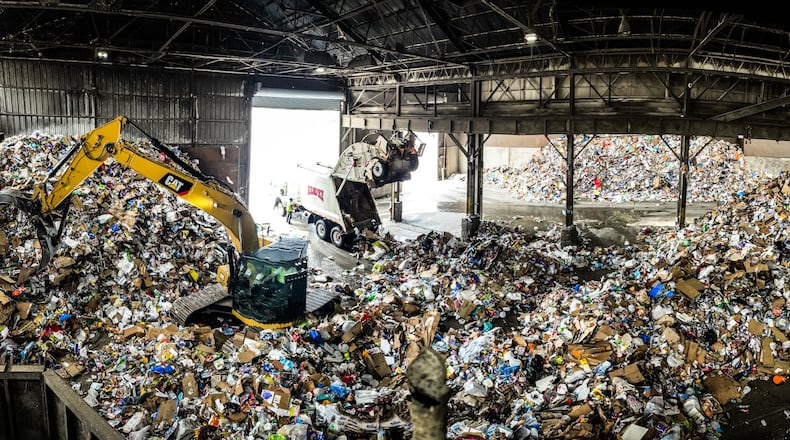According to data from the Ohio EPA, nearly 655,222 tons of waste was disposed of from Montgomery County in 2022, the most recent year reported by the state agency. In that same year, roughly 530,815 tons of recyclables were reported by the Montgomery County Solid Waste District.
Earth Day is Monday. Montgomery County Solid Waste District manager John Woodman said his agency is trying to spread the word about what can and cannot be recycled, but also point to other methods to prevent waste accumulation in landfills.
“It’s really all about landfill diversion,” Woodman said. “You can recycle. You can reuse items. You can even compost a lot of things you would consider throwing away.”
Tracking habits through trash
Garbage trucks from collection services throughout Montgomery County line up outside of the South Facility tipping floor on a daily basis to drop off loads of commercial and residential waste.
“Everything anyone would ever throw away, it all ends up here,” said Woodman.
The Solid Waste District serves as the transfer facility for all waste in Montgomery County, but it also is the site of the county’s recycling canopy. Montgomery County residents can drop off items ranging from small electronics to cardboard to used oil.
The recycling canopy has seen a recent uptick in people dropping off their eclipse glasses, too — enough to fill five large boxes.
The county is also working to determine what people are throwing out instead of recycling.
The county’s solid waste district held a waste audit Thursday morning, where they pulled open bags of trash on their tipping floor to see what contents could be recycled.
Recyclable materials they look for include, in part, the following:
- Glass bottles and jars
- Aluminum cans, steel cans and lids, empty aerosol cans with the lids and tips removed
- Plastic bottles and jugs that have a small mouth and wider base, such as milk jugs, soda bottles, laundry detergent bottles, water bottles, shampoo bottles and contact solution bottles
- Plastic tubs for butter, sour cream, cottage cheese, yogurt, Jello and fruit slices; would fall into the tub category. Lids should be reattached prior to recycling
- Fast food beverage cups, but discard the straw and reattach lid. Plastic cups are also recyclable
- Newspaper, magazines, cardboard, mixed office paper and envelopes, paperboard from cereal boxes, pizza boxes free of food debris and grease, telephone books, junk mail and catalogs
- Food and beverage cartons that store products like milk, broth and more
Those items are sorted into bins by their type, are weighed and then recycled.
The waste audits help give Solid Waste workers a sense of what recyclable items people are throwing away, Woodman said.
Credit: Jim Noelker
Credit: Jim Noelker
The easiest material to recycle is typically metal. Common recyclables are aluminum pop cans and other metal cans that store food, and Solid Waste workers saw dozens of them during Thursday’s waste audit.
Beer bottles and other glass containers, too, are common household items that can be recycled.
Batteries can also be recycled, and Montgomery County accepts batteries at its hazardous material drop off events on Tuesdays.
Waste collectors advise people to never throw away batteries, as they can cause fires that easily grow due to the abundance of paper and plastic products.
Not all plastic can be recycled
Recyclers tuck items away into their bins with the best of intentions, but not every disposable product can be recycled.
Plastic “clamshell” containers that store items like berries or other produce, for example, cannot be recycled, according to Molly Kennedy, the Dayton Region Communications Coordinator for Rumpke.
Another commonly confusing item is plastic grocery bags. Plastic bags can cause a lot of harm to equipment in facilities that process garbage, according to Woodman, because they cling to the parts of different machines.
Woodman suggested that people wanting to minimize the number of plastic bags in landfills should return them to their respective grocery stores or retailers.
Some products, too, are pitched because they come to facilities covered in waste or grease. Contamination is the top reason a recyclable gets thrown away, Woodman said.
Peanut butter jars, for example, cannot be recycled if they’re still slathered in peanut butter, and the same goes for pizza boxes if the lid is covered in cheese and grease. Tin cans used to store cooking grease, too, cannot be recycled.
“Just take a little time to wipe things out or rinse them off before putting them in your recycling bin,” Woodman said.
Recyclables travel across Southwest Ohio, beyond
Woodman’s facility sees nearly 100 trucks per day and roughly 2,500 tons of garbage, but none of it stays at his transfer station long. Waste is hauled away by Rumpke usually within 24 hours.
From there, Rumpke may take the waste to its large material recovery facility on East Monument Avenue in Dayton.
This facility processes roughly 17-20 tons of cardboard per hour, among many other tons of recyclables, according to facility manager Keith Clack.
Also at the facility is a glass plant, where Rumpke workers bring glass containers and bottles through a glass mill to break down glass into a recyclable form — small shards or even fine dust.
To do this, the plant carries glass throughout multiple stages that remove paper from it, sort it by color, and break it down. Dayton glass plant manager Brad Cameron said glass dust is used by companies that produce insulation.
Although Dayton has its own landfill, Montgomery County garbage can travel to Rumpke facilities or the landfill in Cincinnati.
“Our job is to give customers the ability to recycle as many items as we can to not only lower the intake to the landfills, but also, help create more reusable items,” Kennedy said. “It is our objective to provide sustainable solutions to the communities and businesses we serve, ensuring that our combined efforts contribute to a cleaner and greener world today and well into the future.”
About the Author




